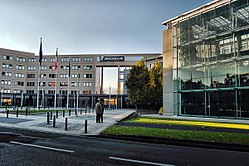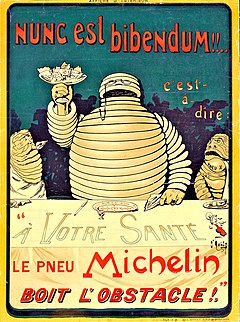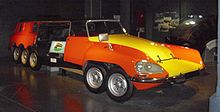Michelin (/ˈmɪʃəlɪn, -læ̃/, French: [miʃlɛ̃]), in full Compagnie Générale des Établissements Michelin SCA ("General Company of the Michelin Enterprises P.L.S."), is a French multinational tyre manufacturing company based in Clermont-Ferrand in the Auvergne-Rhône-Alpes région of France. It is the second largest tyre manufacturer in the world behind Bridgestone and larger than both Goodyear and Continental.[2] In addition to the Michelin brand, it also owns the Kléber tyres company, Uniroyal-Goodrich Tire Company, SASCAR, Bookatable and Camso brands. Michelin is also notable for its Red and Green travel guides, its roadmaps, the Michelin stars that the Red Guide awards to restaurants for their cooking, and for its company mascot Bibendum, colloquially known as the Michelin Man, who is a humanoid consisting of tyres.
 | |
 Headquarters in Clermont-Ferrand, France | |
Native name | Compagnie Générale des Établissements Michelin SCA |
|---|---|
| Company type | Public |
| Euronext Paris: ML CAC 40 Component | |
| Industry | Automotive |
| Founded | 28 May 1889 |
| Founders | |
| Headquarters | , France |
Area served | Worldwide |
Key people |
|
| Brands |
|
| Revenue | |
| Total assets | |
| Total equity | |
Number of employees | 132,000 (2022) |
| Subsidiaries |
|
| Website | michelin |
| Footnotes / references [1] | |
Michelin's numerous inventions include the removable tyre, the pneurail (a tyre for rubber-tyred metros) and the radial tyre. Michelin manufactures tyres for Space Shuttles,[3] aircraft, automobiles, heavy equipment, motorcycles, and bicycles. In 2012, the group produced 166 million tyres at 69 facilities located in 18 countries.[4]
History




In 1889, two brothers, Édouard Michelin (1859–1940) and André Michelin (1853–1931), ran a farm implement business in Clermont-Ferrand, France. One day, a cyclist whose pneumatic tyre needed repair turned up at the factory. The tyre was glued to the rim, and it took over three hours to remove and repair the tyre, which then needed to be left overnight to dry. The next day, Édouard Michelin took the repaired bicycle into the factory yard to test. After only a few hundred metres, the tyre failed. Despite the setback, Édouard was enthusiastic about the pneumatic tyre, and he and his brother worked on creating their own version, one that did not need to be glued to the rim. Michelin was incorporated on 28 May 1889. In 1891 Michelin took out its first patent for a removable pneumatic tyre which was used by Charles Terront to win the world's first long-distance cycle race, the 1891 Paris–Brest–Paris.
In the 1920s and 1930s, Michelin operated large rubber plantations in Vietnam. Conditions at these plantations led to the famous labour movement Phu Rieng Do.[5]

In 1934, Michelin introduced a tyre which, if punctured, would run on a special foam lining, a design now known as a run-flat tyre (self-supporting type).
Michelin developed and patented a key innovation in tyre history, the 1946 radial tyre, and successfully exploited this technological innovation to become one of the world's leading tyre manufacturers.[7] The radial was initially marketed as the "X" tyre.[8] It was developed with the front-wheel-drive Citroën Traction Avant and Citroën 2CV in mind. Michelin had bought the then-bankrupt Citroën in the 1930s. Because of its superiority in handling and fuel economy, use of this tyre quickly spread throughout Europe and Asia.[7] In the U.S., the outdated bias-ply tyre persisted, with a market share of 87% in 1967.[7]
In 1966, Michelin partnered with Sears to produce radial tyres under the Allstate brand and was selling 1 million units annually by 1970.[9]
In 1968, Michelin opened its first North American sales office, and was able to grow that market for its products rapidly; by 1989 the company had a 10% market share for OEM tyres purchased by American automobile makers.[10]
Also in 1968, Consumer Reports, an influential American magazine, acknowledged the superiority of the radial construction, setting off a rapid decline in Michelin's competitor technology.[9] In the U.S., the radial tyre now has a market share of 100%.[7]
In addition to the private label and replacement tyre market, Michelin scored an early OEM tyre win in North America, when it received the contract for the 1970 Continental Mark III, the first American car with radial tyres fitted as standard.[11]
In 1989, Michelin acquired the recently merged tyre and rubber manufacturing divisions of the American firms B.F. Goodrich Company (founded in 1870) and Uniroyal, Inc. (founded in 1892 as the United States Rubber Company) from Clayton, Dubilier & Rice.[10][12] Uniroyal Australia had already been bought by Bridgestone in 1980. This purchase included the Norwood, North Carolina manufacturing plant which supplied tyres to the U.S. Space Shuttle Program.[13][14]
As of 1 September 2008, Michelin is again the world's largest tyre manufacturer after spending two years as number two behind Bridgestone.[15] Michelin produces tyres in France, Serbia, Poland, Spain, Germany, the US, the UK, Canada, Brazil, Thailand, Japan, India, Italy and several other countries. On 15 January 2010, Michelin[16] announced the closing of its Ota, Japan plant, which employs 380 workers and makes the Michelin X-Ice tyre. Production of the X-Ice will be moved to Europe, North America, and elsewhere in Asia.[17] In 2019, Michelin announced that plants in Germany and France are to be closed soon.[18]
Michelin also controls 90% of Taurus Tyre in Hungary, as well as Kormoran,[19] a Polish brand.
In December 2018, Michelin acquired Camso, a manufacturer of off-the-road tyres, tracks, and accessories for power sports, agriculture, material handling and construction markets.[20]
On 22 January 2019, it was announced that Michelin had acquired Indonesian manufacturer Multistrada Arah Sarana, which produces Achilles Radial and Corsa tyres.[21] On 19 June that year, Michelin owns 99.64% of the share capital of Multistrada.[22]
Motorsport

MotoGP
Michelin participated in MotoGP from 1972 to 2008. They introduced radial construction to MotoGP in 1984, and multi-compound tyres in 1994. They achieved 360 victories in 36 years, and from 1993 to 2006, the world championship had gone to a rider on Michelins.
In 2007, Casey Stoner on Bridgestone tyres won the world championship in dominating fashion, and Valentino Rossi and other top riders complained that Michelins were inferior. Rossi wanted Bridgestones for the 2008 season, but Bridgestone was reluctant to provide them; Dorna threatened to impose a control tyre on the series, after which Bridgestone relented.
In 2008, Michelin committed errors of judgment in allocating adequate tyres for some of the race weekends. Dani Pedrosa's team switched to Bridgestones in the midst of the season, a highly unusual move that caused friction between Honda Racing Corporation and their sponsor Repsol YPF. Other riders also expressed concerns and it seemed that Michelin might not have any factory riders for the 2009 season, leading to rumours that Michelin would withdraw from the series altogether. Dorna and the FIM announced that a control tyre would be imposed on MotoGP for the 2009 season and Michelin did not enter a bid, effectively ending its participation in the series at the end of 2008.[23][24][25][26]
Michelin returned to MotoGP in 2016 as the official tyre supplier after Bridgestone's withdrawal from the series at the end of 2015.[citation needed]
Formula One
Michelin first competed in the 1977 Formula One season, when Renault started the development of their turbocharged F1 car. Michelin introduced radial tyre technology to Formula One and won the Formula One Drivers' Championship with Brabham and McLaren, before withdrawing at the end of 1984.
The company returned to Formula One in 2001, supplying the Williams, Jaguar, Benetton (renamed Renault in 2002), Prost and Minardi teams. Toyota joined F1 in 2002 with Michelin tyres, and McLaren also signed up with the company. Michelin Tyres were initially uncompetitive but by the 2005 season were dominant. This was partly because the new regulations stated that tyres must last the whole race distance (and qualifying), and partly because only one top team (Ferrari) was running Bridgestones, and so had to do much of the development work. Michelin in contrast had much more testing and race data provided by the larger number of teams running their tyres.
Following the debacle of the 2005 United States Grand Prix where, because of safety concerns, Michelin would not allow the teams it supplied to race, Michelin's share price fell by 2.5% (though it recovered later the same day). On 28 June, Michelin announced that it would offer compensation to all race fans who had bought tickets for the Grand Prix. The company committed to refunding the price of all tickets for the race. Additionally, it announced that it would provide 20,000 complimentary tickets for the 2006 race to spectators who had attended the 2005 event.
Michelin has had a difficult relationship with the sport's governing body (the FIA) since around 2003 and this escalated to apparent disdain between the two parties during the 2005 season. The most high-profile disagreement was at the United States Grand Prix and the acrimony afterwards. Michelin criticised the FIA's intention to move to a single source (i.e. one brand) tyre from 2008 and threatened to withdraw from the sport. In a public rebuke, FIA President Max Mosley wrote: "There are simple arguments for a single tyre, and if [Michelin boss Édouard Michelin] is not aware of this, he shows an almost comical lack of knowledge of modern Formula One". Another bone of contention has been the reintroduction of tyre changes during pit-stops from 2006. Michelin criticised the move claiming "this event illustrates F1's problems of incoherent decision-making and lack of transparency".
In December 2005, and as a result of the difficult relationship with the sport's governing body, Michelin announced that it would not extend its involvement in Formula One beyond the 2006 season.[27] Bridgestone was then the sole supplier of tyres to Formula One until the end of the 2010 season, with Pirelli providing tyres for 2011.
The last race won on Michelin tyres in Formula One was the 2006 Japanese Grand Prix, Fernando Alonso benefitted after the Ferrari engine of Michael Schumacher failed during the race. This gave Michelin a second consecutive Constructors' Championship win, with the 2005 and 2006, after Bridgestone's seven-year winning streak, and brought to a total of four the number of titles for Michelin since this championship's inception back in the 1958 Formula One season; Michelin's other titles were in the 1979, and 1984 seasons.
Endurance racing
Michelin is involved in endurance races such as the 24 Hours of Le Mans and the American Le Mans Series. Involvement in Le Mans began with supplying tyres for the winner of the inaugural 1923 24 Hours of Le Mans as well as nine others of the 33 entrants.[28][29] In 2009 Michelin supplied tyres for 41 of the 55 cars that entered in Le Mans.[30] In 2016 they provided tyres to the Audi, Porsche and Toyota LMP1 teams, as well as the AF Corse, BMW, Corvette, Ford Ganassi, Porsche and Risi teams in GTE-Pro / GTLM. Beginning in 2019, Michelin will replace Continental as the official tyre of the WeatherTech SportsCar Championship.[31] Along with supplying tyres for IMSA's top three series, the partnership includes naming rights for the Sports Car Challenge series and the North American Endurance Cup.
Michelin has also supplied tyres in the European Le Mans Series. They have been the exclusive supplier of the LMP3 class since 2015.
Rallying
In the World Rally Championship, Michelin has been the supplier of the Audi, Citroën, Ford, Lancia, Mitsubishi, Peugeot, Toyota and Volkswagen factory teams. Michelin Group brand BFGoodrich represented the brand in 2006 and 2007. The company was absent from 2008 to 2010, when Pirelli was signed as the official supplier, after which they returned to the series as an official supplier from 2011 to 2020 until Pirelli won the tender to once again become an official supplier from 2021 onwards.
Recent developments
- Pax System
- Tweel
- X One
- Agri
- BAZ Technology. Michelin employs specific tread construction, that uses spiral-wrapped nylon strips. The strips are applied in the tread area above steel belts in order to oppose centripetal force, in order to avoid tyre distortion at high speeds.
- EverGrip Technology. This is a patented safety technology that allows combining tread grove design. This way, it does not just wear down, but evolves due to high traction tread compound, which makes driving safer on snowy and wet roads.
- Zero Pressure Technology means a reinforced sidewall that is designed to continue supporting the vehicle's weight even when air pressure is lost. The technology allows driving at speeds between 50 and 55 mph for some time.
Active Wheel
Active Wheel from Michelin includes in-wheel electric motors and a motorised suspension to free up space in the front or rear of the vehicle. This model also eliminates the need for other notorious space hogs like transmissions and exhaust systems. The wheels already have a vehicle ready to receive them, the Heuliez Will from Opel, and are also expected to come standard on the Venturi Volage sometime in 2012.[32] The project was interrupted in 2014.[33]
Other products

Tyre retailer
Tyre retail in Europe with Euromaster and in the US with its wholly owned subsidiary TCI Tyre Centers.[34]
Tour guides
Michelin has long published two guidebook series, the Red Guides for Hotels and Restaurants, and the Green Guides for tourism. It now publishes several additional guides, as well as digital maps and guide products. The city maps in both the Red and the Green guides are of high quality, and are linked to the smaller-scale road maps.
Maps
Michelin publishes a variety of road maps, mostly of France but also of other European countries, countries in Africa, Thailand and the United States. They have recently embarked on e-commerce selling Michelin maps and guides directly to the public through, for example, their UK website.[35] The Michelin roadmaps were reproduced in England for the Allied invasion during World War II. In 1940, the Germans also reproduced the 1938 edition of Michelin maps for the invasion.[36]
Online mapping
ViaMichelin is a wholly owned subsidiary of Michelin Group, and was started in 2001, to represent Michelin's digital mapping services. As of August 2008, ViaMichelin generates 400 million maps and routes per month on its main website.[37]
ViaMichelin provides mapping for internet, mobile and satellite navigation products with street level coverage of Europe, USA, Australia, and parts of Asia and South America.
Michelin Challenge Bibendum / Movin'On (since 2017)
The Michelin Challenge Bibendum is a major sustainable mobility event.
Michelin Truck and Bus

In 1952, 6 years after Michelin patented its Radial Casing, Michelin adapted the radial technology to truck tyres.[38]
Management

From 1999, the company was headed by CEO Édouard Michelin. On 26 May 2006, Édouard drowned while fishing near the island of Sein, off the coast of Brittany.[40] His death brought Michel Rollier, a 2nd cousin of Édouard Michelin, to the head of the company. Rollier was replaced in May 2012 by Jean-Dominique Senard.[41] In 2018, Jean-Dominique Senard announced he would not seek re-election at the shareholders' meeting in 2019. As a result, the shareholders elected Florent Menegaux to succeed Senard starting in 2019.
The company also has its headquarters in Greenville, South Carolina, United States as Michelin North America. They first manufactured in the city in 1975 before opening up their headquarters a decade later.[39]
Corporate governance
Corporate governance consists of 2 managers and an executive committee whose members are:[1]
- Éric-Philippe Vinesse, Executive Vice President, Research & Development
- Lorraine Frega, Executive Vice President, Distribution, Services & Solutions, Strategy, Innovation and Partnerships
- Yves Chapot, General Manager and Chief Financial Officer
- Adeline Challon-Kemoun, Executive Vice President, Engagement and Brands
- Jean-Claude Pats, Executive Vice President, Personnel
- Bénédicte de Bonnechose, Executive Vice President, Urban and Long-Distance Transportation and European Regions
- Pierre-Louis Dubourdeau, Executive Vice President, Manufacturing
- Florent Menegaux, Managing Chairman
- Scott Clark, Executive Vice President, Automotive, Motorsports, Experiences and Americas Regions
- Serge Lafon, Executive Vice President, Specialties and Africa/India/Middle East, China, East Asia and Australia Regions
- Maude Portigliatti, Executive Vice President, High-Tech Materials.
See also
References
External links

- Official website
- Yahoo! – Compagnie Générale des Établissements Michelin Company Profile
- How Is It Made
- Documents and clippings about Michelin in the 20th Century Press Archives of the ZBW
- Michelin Tyres Middle East
- Michelin Map Collection Archived 23 March 2020 at the Wayback Machine at the Newberry Library


